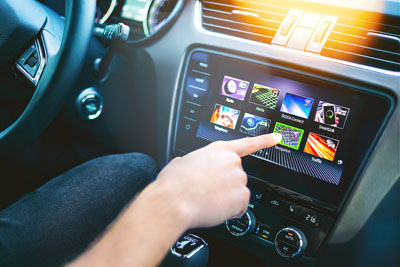New-car buyer appetites for electric vehicles (EVs) are evolving and connected vehicle technology is becoming a key selling point for EV adoption, according to new study findings from Escalent, a data analytics and advisory firm.
Connected vehicle technology is becoming more of an expected EV benefit, rising from 26% in 2022 to 33% in 2023 for "EV intenders," consumers who are more than 15 times more likely to purchase an EV than the average new-car buyer, according to Escalent’s research.
“There has been a notable shift in what new-car buyers want in an EV, and state-of-the-art technology is rising in importance,” said Ben Lundin, insights director with Escalent’s Automotive & Mobility practice. “We’ve seen this trend blossom since launching our EVForward study in 2020, and as a result, we’ve updated our EVForward algorithms to reflect technological appetite, instead of environmentalism, as a key driver of EV intention for future EV buyers.”
Those are the latest findings from Escalent’s EVForward™ research program, the largest, most comprehensive study of the next generation of EV buyers that provides insight into the minds of today’s and tomorrow’s EV shoppers.
The study also found 60% of EV intenders and 54% of EV owners spend more than three hours per week in their vehicle, compared with approximately 48% of all new-car buyers. This is important because consumers who spend more time in their vehicle are more likely to be familiar with vehicle connectivity, connect their phone to their vehicle every time they drive, use existing connected car features and use OEM-provided apps.
Additionally, approximately two-thirds of all EV owners, EV intenders and luxury car owners say they will not consider an EV unless it has connected car technology.
“Nowadays, consumers expect EVs to fit seamlessly into their preexisting tech ecosystem, which is largely driven by smartphones and their home technology preferences and attitudes,” said Rich Clarke, vice president at Escalent and vehicle connectivity expert who leads the company’s new study on future adopters of connected vehicle services, Connectivity Forward™. “If an EV doesn’t interact seamlessly with future EV buyers’ connected life, it may become a barrier to purchase. On the other hand, given the growing tech orientation of future EV buyers, there is greater opportunity for connected vehicle services among EV buyers than among the general new-car buyer population.”
Additionally, connected car technology can help shoppers overcome some key EV purchase barriers. The EVForward study found features such as range alerts, range estimators, battery level status updates, battery diagnostics and charging finders/routing tools can help alleviate consumer concerns about range, battery life, access to public charging and more. Beyond addressing EV barriers, 44% of shoppers believe connected vehicle services would make EV ownership more convenient.
As automakers ramp up production of new EV models and EVs make up a higher percentage of new-car sales than ever, the findings also revealed EV intenders make up a larger portion of the new-car buyer marketplace, now sitting at 25%, up from 21% in 2022. Meanwhile, the share of "EV open" has fallen from 40% in 2022 to 35% in 2023, reflecting how new-car buyers who are receptive to purchasing an EV may be climbing up the EV adoption ladder, with EV owners increasing from 1% in 2022 to 3% in 2023.
This trend is likely to continue as more consumers are becoming familiar with and more likely to consider EVs:
- 37% of new-car shoppers report they’ve either driven an EV or know the powertrain well in 2023, compared with 32% in 2022.
- 40% report knowing at least a few friends or family who own an EV, compared with 34% in 2022.
- 43% perceive EVs to be a practical option, compared with 39% in 2022.
- EV consideration rose to 38%, up from 35% in 2022.
“We’re seeing new-car buyers increasingly recognize how an EV can fit into their life. This is likely tied to increased awareness of public charging, the national EV infrastructure buildout, and the release of new and compelling EV models,” said K.C. Boyce, vice president with the Automotive & Mobility and Energy practices at Escalent. “Consumers not only expect a certain level of innovation in EVs, but there’s a growing number who consider connected car technology to be a key element for making EV ownership more reassuring and rewarding. The takeaway for industry players is that delivering EVs to the early majority goes hand in hand with integrating cutting-edge connected vehicle services that address specific EV barriers and enhance the overall EV driving experience.”
To learn more about the study, visit escalent.co.
Source: Escalent












